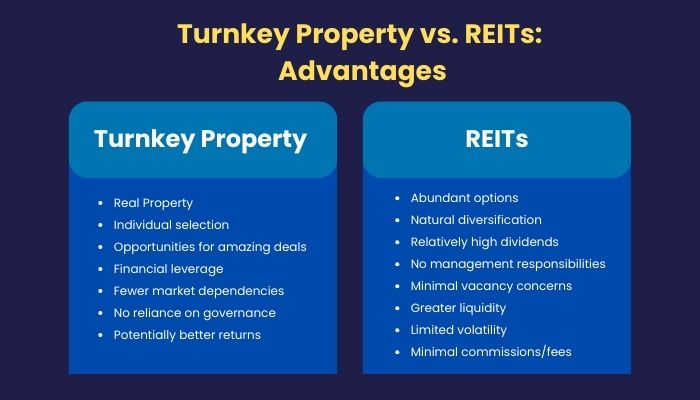One of the reasons the real estate investing world is so attractive is that it occupies a massive space. There are many different ways to get involved in real estate investing, regardless of how much knowledge, experience, and capital you have.
Turnkey properties, designed to be immediately rentable, offer a convenient and accessible way to get into the real estate management game. But entities known as real estate investment trusts (REITs) are arguably even more accessible.
Which is better for your real estate portfolio?

Contents
How Real Estate Investment Trusts (REITs) Work
Let’s start with a primer on how real estate investment trusts (REITs) work.
REITs are companies owned and operated by active real estate investors. These companies typically buy, sell, and manage real estate in ways that are profitable to shareholders. They may specialize in certain types of real estate, such as commercial or residential, or they may operate more generally.
In any case, you can buy and sell shares of REITs just as you might buy and sell shares of stock. These are relatively liquid assets that you can buy through any brokerage app, and generally for no commissions. The price of each share will increase or decrease according to the performance of the trust. If it does better, the price will likely go up. If it does worse, the price will likely go down.
On top of that, shareholders of most REITs are periodically entitled to dividend distributions. These trusts collect profits and distribute them to shareholders, often on a quarterly basis. Accordingly, shareholders typically benefit from both regular cash flow and appreciating asset value, even if they aren’t directly owning the real estate responsible for generating these proceeds.
There are two main, broad categories of REITs: equity REITs and mortgage REITs (or mREITs). Equity REITs focus on buying, selling, and managing properties. Conversely, mREITs make their money by owning and managing mortgages. Some REITs also attempt to hybridize these approaches.
REITs can also be public or private. Publicly traded REITs are more transparent, more accessible, and more liquid. However, privately held REITs can offer other benefits, such as potentially higher growth and more investor involvement.
The Advantages of Turnkey Property Investing
So how does investing in a turnkey property stack up to the prospect of investing in REITs?
- Real property. Both REITs and turnkey properties allow you to invest in the real estate market. However, investing in turnkey properties allows you to directly invest in real, physical spaces. This gives you much more control over the properties you own and gives you more options in the future. You can choose how you renovate, upgrade, and maintain your properties, and you can even use them for your own purposes if you’re not currently renting them. If you exclusively invest in REITs, you’ll only be owning real estate indirectly.
- Individual selection. When you invest in REITs, you’ll effectively be delegating all of your real estate management decisions. Decision makers in REITs often have lots of experience and good track records, but many investors like having more control over their own portfolios. If you focus on buying and managing turnkey properties, you will be able to exercise much more control over the individual additions you put into your portfolio.
- Opportunities for amazing deals. Some investors love REITs because they provide an opportunity to get exposure to the entire real estate market, or at least one large segment of the real estate market. But this isn’t always the best way to invest. Other investors prefer looking for amazing deals, such as properties that are notoriously undervalued or properties in up and-coming neighborhoods that have potential for significant growth. If you focus exclusively on REITs, you might miss some of these impressive gems.
- Financial leverage. Financial leverage is a massive advantage for people who know how to utilize it. Essentially, financial leverage is investing with other people’s money. By taking advantage of mortgages, you can invest in properties that you wouldn’t be able to buy outright; this also allows you to snowball your wealth more easily, assuming you can handle the risks associated with carrying more debt. It’s much easier to take advantage of financial leverage when buying individual properties, rather than investing in REITs.
- Fewer market dependencies. REITs need good markets to do well. Decision makers are dependent on factors like interest rates and available capital to make effective real estate investing decisions. As an individual investor focusing on turnkey properties, you’ll have far fewer market dependencies; with a bit of proactive planning, you can devise systems that allow you to thrive in almost any economic environment.
- No reliance on governance. When you invest in REITs, you’ll be almost entirely dependent on the governance of that organization to see a meaningful return. Other people will be making all the decisions for you, for better or for worse. When you invest in properties on your own, you’ll have no reliance on external governance and you’ll be in charge of all the decisions.
- Potentially better returns. When it comes to returns, there isn’t a definitive answer for whether individual properties or REITs perform better; there are simply too many variables in play. Still, when effectively managed, turnkey properties do have the potential to offer better returns.
The Advantages of REITs
REITs also have some impressive advantages to offer over turnkey properties:
- Abundant options. We’re not being especially fair with this one, since turnkey properties represent a specific subset of properties available for individual investors. However, it’s important to recognize that REITs come in many different forms, shapes, and sizes. For almost any type of conceivable real estate investment, you can find a REIT. This means REITs can fit into almost any portfolio.
- Natural diversification. Even novice investors know the importance of diversifying a portfolio. Diversifying your holdings means you’ll be less susceptible to volatility and you’ll be able to mitigate risk. It’s also beneficial to diversify because it stabilizes your earnings and returns, insulating you from spikes and shocks. Buying an individual turnkey property doesn’t make for a properly diversified portfolio. However, REITs typically offer some marginal diversification by virtue of their own existence. Remember, most REITs are investing in many, many different properties, often in different areas and from different sectors. Owning shares in even a single REIT will provide you with more diversification than investing in a single turnkey property.
- Relatively high dividends. Some people love REITs because they offer relatively high dividends, especially when compared to other assets like stocks. This is partially because it’s economically advantageous for REITs to distribute as much of their profits as possible. In any case, investors stand to benefit enormously from REITs that continue to perform exceptionally well.
- No management responsibilities. One of the biggest practical advantages of investing in REITs overturn key properties is that you won’t have any management responsibilities. If there’s a standing vacancy, it won’t be your job to fill it. If a tenant requests an emergency repair, someone else will handle it. You won’t even have to make decisions about buying and selling properties at the right time. Some other expert is going to take care of all of that for you.
- Minimal vacancy concerns. If you have only one or two turnkey properties in your portfolio and they start experiencing prolonged vacancies, it’s going to kill your cash flow. Sure, you can screen your tenants and build rapport with them to prevent extended vacancies, but vacancies can and do still happen. With REITs, vacancies are less of a concern, as you’ll be indirectly exposed to many properties simultaneously. Even if several properties in the portfolio are struggling with vacancies, the rest of the portfolio will naturally balance them out.
- Greater liquidity. In many cases, REITs offer greater liquidity when compared to turnkey properties. If you want to sell a property, you’ll need to fix it up, list it for sale, and probably wait several weeks to several months for offers to roll in. If you want to sell a share of your REIT, you can probably sell it instantaneously. Do note that public REITs are much more liquid than private ones, and not all trusts offer the same level of liquidity.
- Limited volatility. Markets ebb and flow, and with them, prices rise and fall. However, because the portfolio of properties in a REIT is so large and so diverse, most REITs have limited volatility. These assets can and will suffer losses whenever the real estate market suffers a decline, but they generally aren’t subject to massive swings in either direction.
- Minimal commissions/fees. Experienced real estate investors know that extra fees and costs associated with buying and selling properties can be considerable. If you work with a real estate agent to sell your property, you’ll probably owe a significant commission, ultimately eating into your profitability. However, when buying and selling shares of REITs, you’ll probably owe very little, if anything in commissions and fees.
Which One Is Right for You?
So which one is right for you?
First, the good news: you aren’t limited to investing in only one of these assets. You can invest in and manage your own turnkey properties while simultaneously investing in REITs. For many investors, pursuing both can lead to a more balanced real estate portfolio.
That said, after seeing the advantages and disadvantages of each, you’re probably leaning toward one over the other. Based on your investment goals, your current knowledge and experience level, your risk tolerance, and other factors it’s likely that turnkey properties or REITs will look much more attractive to you. This is highly dependent on the individual, as we can’t make a broad declaration that one is objectively superior to the other.
If you like the idea of no management responsibilities, no fees, and natural diversification, REITs are likely the better choice. If you want more control, more discretion, and opportunities for even higher returns, individual turnkey properties are probably better.
Are you struggling to figure out what to do with your real estate portfolio?
Or are you looking to enter the market with a turnkey property of your own?
Our investors and advisors are here to help you with anything and everything you need. If you’re ready to get started with a free consultation, contact us today!
- Is This Real Estate Property Truly Turnkey? 13 Things to Check - November 8, 2024
- Are “As Is” Properties Worth Considering as a Real Estate Investor? - October 28, 2024
- How to Manage Liquidity Issues in a Real Estate Portfolio - October 18, 2024

